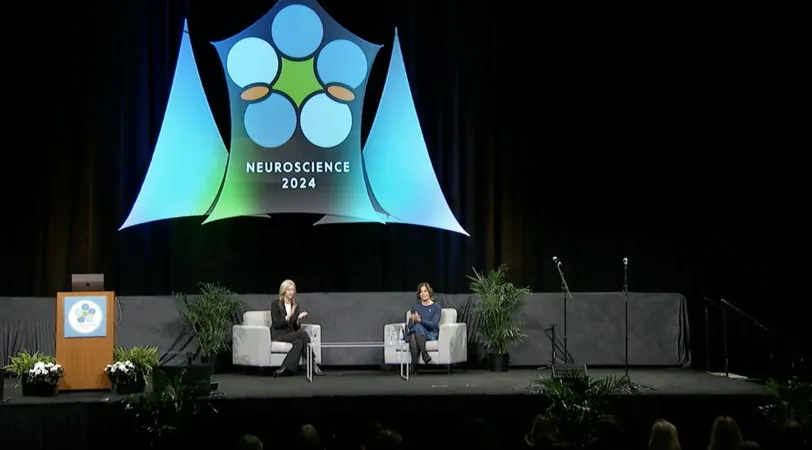
Unveiling the Surprising Health Benefits of Art at the Neuroscience Conference
2024-10-05
Unveiling the Surprising Health Benefits of Art at the Neuroscience Conference
The highly anticipated annual Society for Neuroscience (SfN) conference is currently taking place in the vibrant city of Chicago, attracting thousands of neuroscientists eager to delve into the latest advancements in neuroscience research. While discussions around understanding the complexities of the brain and exploring artificial intelligence's role in advancing research dominate the agenda, this year's conference has made a striking move by putting art at the forefront.
In a departure from standard practice at many scientific gatherings, SfN has consistently emphasized the intersection of art and science. This year, participants not only got to explore neuroscience-themed art crafted by a select group of artists but also kicked off the conference with a two-hour session dedicated to the neuroscience of art itself.
Renowned speaker Susan Magsamen, who leads the International Arts and Mind Lab at Johns Hopkins University, delivered an enlightening opening lecture that spotlighted the emerging field of neuroarts research. She shared captivating data from the Penn Center for Neuroaesthetics, revealing a growing number of scientists investigating how our brains respond to beautiful and aesthetically pleasing visuals. This research area is crucial as it provides deeper insights into how artistic expression can influence cognitive and emotional health.
Music’s pivotal role in this dialogue cannot be overlooked. Highlights from this conference included former National Institutes of Health (NIH) Director Francis Collins, who initiated the Sound Health initiative. This groundbreaking collaboration with the National Symphony Orchestra aims to unveil the profound connections between music and mental well-being.
Magsamen emphasized the significant impact of art on mental health, arguing that the data collected from various studies increasingly illustrate its value. She referenced notable initiatives like the Mark Morris Dance Group, which has been integral in multiple research papers advocating the benefits of dance for individuals suffering from Parkinson's disease. Similarly, there is compelling evidence suggesting that music therapy can aid those with Alzheimer's disease, while programs like “Creative Forces” utilize art therapy to assist military personnel and veterans grappling with mental health challenges.
In a fascinating discussion that followed her lecture, Magsamen joined forces with SfN president Marina Picciotto to highlight the uncharted territories awaiting exploration at the intersection of art and health. Citing a comprehensive report from researchers at University College London, Magsamen noted that over 600 avenues still need to be investigated regarding how the arts affect health. "There is a lot of work to be done," she reiterated, underlining the importance of fostering an interconnected community of researchers.
In collaboration with Ruth Katz, Magsamen co-directed the NeuroArts Blueprint, a pivotal initiative designed to consolidate resources and guidelines for research in this innovative domain. An anticipated Neuroarts Resource Center is set to launch in the forthcoming months, further solidifying this exciting interdisciplinary venture.
As part of this art-infused conference, attendees were treated to a lively session with musicians Jonas Friddle, Anna Jacobsen, and Andrew Wilkins. They led a fun, interactive performance of “You May Leave, but This Will Bring You Back,” originally by Memphis Jug Band. Audience members were provided with kazoos and taught catchy lines, allowing them to actively participate and experience the therapeutic effects of music-making.
The engagement didn’t just serve as entertainment; it emphasized the vital connection between creative expression and mental health. Attendees left with their kazoos in hand, a whimsical reminder of the discovery that art isn’t just for appreciation but is a powerful conduit for healing and understanding the mind.
As this year's SfN conference continues, it is clear that the marriage of art and neuroscience holds incredible promise for advancing research and enhancing mental health, opening exciting doors for future studies and therapeutic practices. Standby for more as this crucial dialogue unfolds amidst the fascinating findings emerging from the conference!


 Brasil (PT)
Brasil (PT)
 Canada (EN)
Canada (EN)
 Chile (ES)
Chile (ES)
 España (ES)
España (ES)
 France (FR)
France (FR)
 Hong Kong (EN)
Hong Kong (EN)
 Italia (IT)
Italia (IT)
 日本 (JA)
日本 (JA)
 Magyarország (HU)
Magyarország (HU)
 Norge (NO)
Norge (NO)
 Polska (PL)
Polska (PL)
 Schweiz (DE)
Schweiz (DE)
 Singapore (EN)
Singapore (EN)
 Sverige (SV)
Sverige (SV)
 Suomi (FI)
Suomi (FI)
 Türkiye (TR)
Türkiye (TR)